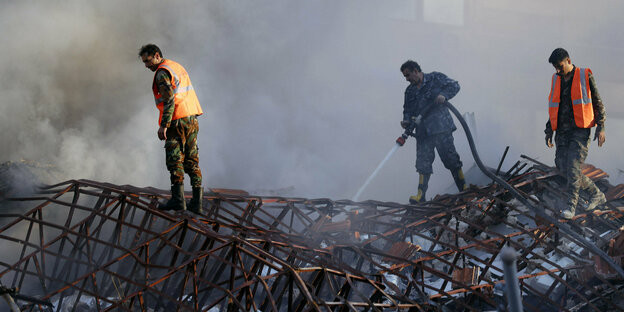With the assassination of senior commanders of the Revolutionary Guard in Damascus, the capital of Syria, Israel provokes its eternal adversary Iran.

Clear message: firefighting work in the affected building in Damascus Photo: Omar Sanadiki/ap
BEIRUT taz | Tensions have been high between Iran and Israel since a suspected Israeli airstrike on the Iranian embassy compound in Damascus, the Syrian capital, killed at least 13 people on Monday night. Iranian President Ebrahim Raisi announced retaliatory attacks against Israel on Tuesday. Iranian Ambassador Hossein Akbari, who was unharmed, said Israeli warplanes carried out the attack.
Iranian Foreign Minister Hossein Amir-Abdollahian accused Israel of violating all international agreements. Arab states including Egypt, Jordan, Saudi Arabia and Qatar said in statements that the attack on the embassy grounds was a violation of international law and diplomatic immunity.
Although Israel did not claim responsibility for the attack, government spokesman Avi Hyman told Sky News: “The building that was attacked was not a consulate, nor an embassy, nor a diplomatic mission, and I dare say that the Iranian people in “We probably weren't there in this building to hand out Easter eggs.”
According to Tehran, the victims included two brigadier generals and five members of the Revolutionary Guard (IRGC), including commander Mohammad Reza Zahedi and his deputy. The Revolutionary Guard is a military force that is considered more powerful than the Iranian army. The unit aims to prevent an internal coup d'état and defend the state ideology.
Abroad, the Guard's elite unit, the so-called Al-Kuds Brigade, supports pro-Iran groups. Zahedi was the commander of this paramilitary wing. He gave orders to units in Syria and Lebanon and had good relations with Hezbollah and Syrian President Bashar al-Assad, who support Iran in the fight against Israel.
“Attacks are back on the agenda”
Israel, along with the United States, has repeatedly attacked military targets of Tehran-backed militias. This is the first attack on a diplomatic facility. Iranian President Raisi called Tuesday morning's airstrike unprecedented and promised a tough response. Israel has “put assassinations back on its agenda.”
Meanwhile, pro-Iran militias in the region are reacting. The Islamic Resistance group in Iraq said it had attacked the US military base in al-Tanf, southeastern Syria, with drones on Tuesday night. Pro-Iran militias have repeatedly attacked US military bases in Iraq and Syria. The United States responded with extensive airstrikes against militia positions. However, the situation has been calmer since early February.
Brigadier General Zahedi is the highest-ranking Iranian military officer killed since General Qasim Suleimani. Suleimani was the commander-in-chief of the Quds Force and was killed by the United States in a drone strike in Baghdad in January 2020, presumably with the help of Israeli intelligence. Iran responded by firing rockets at US bases in Iraq, but none of the US soldiers stationed there were injured. Soleimani became a celebrated martyr and icon against imperialism among supporters of the Iranian regime.
The United States is seen as a supporter of Israel and gives it a share of responsibility, Iranian Foreign Minister Hussein Amir-Abdollahian said in X. The United States and Iran have not maintained diplomatic relations for 44 years. That is why the Iranian Foreign Ministry sent an “important message” to the United States through a Swiss diplomat. The minister did not say what specifically. A spokesperson for the United States Security Council told the American media axiosthat the United States “was not involved in the attack and we did not know it beforehand.”
The location of the attack is crucial.
More important than the high-ranking brigadier generals is the location of the attack itself, analyzed Lebanese politics professor Joseph Bahout on X: “The Iranian consulate in Syria is almost Iranian territory, it has legal and symbolic value. Tehran cannot help but interpret this as a crossing of the red line.” The response is guaranteed, also analyzes Charles Lister, director of the anti-terrorism program at the Middle East Institute.
In The question does not seem to be whether, but rather As Iran retaliated. “The question is whether it will be directed against Israel, the Israelis, US regional facilities… or something else.” Since Iran often attacks US troops in retaliation for Israeli actions, Lister expects such attacks to resume in Syria and Iraq. In addition, longer-range rockets would be fired, including at Israel.
A major war between Iran and Israel is “unlikely,” American political scientist Saeid Golkar told the British on Tuesday. guardian. Golkar himself taught in Iran in the early 2000s. He believes that Iran could attack not Israel, but “certain positions such as Erbil in Iraq or the Republic of Azerbaijan.”